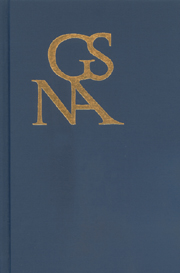Book contents
- Frontmatter
- Contents
- Presidential Address (December, 2004) Schiller vs. Goethe: Revisiting the Conflicting Reception Vectors of Heinrich Heine, Ludwig Börne, and Wolfgang Menzel
- Goethe's Mixed Media: The Entertainers in Jahrmarktsfest zu Plundersweilern
- Goethe's “Ilmenau” and the Origins of the Aesthetic State
- Familial Politics and Political Families: Consent, Critique, and the Fraternal Social Contract in Schiller's Die Räuber
- Paintings in Goethe's Wilhelm Meister Novels: The Dynamics of Erecting and “Eroding” the Paternal Law
- “Waldplatz,” “Wahlplatz”: Miszelle zur Golgatha-Konnotation einer Episode in Wilhelm Meisters Lehrjahre
- Shocks from a Sicilian Underworld: Gangi,“Gänge,” and a New Source for the “Mütter” in Goethe's Faust
- “Feuer brennen blau”: Rethinking the Rainbow in Goethe's Faust
- Cosmopolitanism and Weltliteratur
- “Von jedem öffentlichen Wirken in Deutschland ausgeschloßen”: Ein Brief Ottilie von Goethes an Sarah Austin (4. Aug. 1840)
- Book Reviews
Shocks from a Sicilian Underworld: Gangi,“Gänge,” and a New Source for the “Mütter” in Goethe's Faust
Published online by Cambridge University Press: 05 February 2013
- Frontmatter
- Contents
- Presidential Address (December, 2004) Schiller vs. Goethe: Revisiting the Conflicting Reception Vectors of Heinrich Heine, Ludwig Börne, and Wolfgang Menzel
- Goethe's Mixed Media: The Entertainers in Jahrmarktsfest zu Plundersweilern
- Goethe's “Ilmenau” and the Origins of the Aesthetic State
- Familial Politics and Political Families: Consent, Critique, and the Fraternal Social Contract in Schiller's Die Räuber
- Paintings in Goethe's Wilhelm Meister Novels: The Dynamics of Erecting and “Eroding” the Paternal Law
- “Waldplatz,” “Wahlplatz”: Miszelle zur Golgatha-Konnotation einer Episode in Wilhelm Meisters Lehrjahre
- Shocks from a Sicilian Underworld: Gangi,“Gänge,” and a New Source for the “Mütter” in Goethe's Faust
- “Feuer brennen blau”: Rethinking the Rainbow in Goethe's Faust
- Cosmopolitanism and Weltliteratur
- “Von jedem öffentlichen Wirken in Deutschland ausgeschloßen”: Ein Brief Ottilie von Goethes an Sarah Austin (4. Aug. 1840)
- Book Reviews
Summary
EVERY YEAR, ON THE SECOND Sunday of August,“la Sagra della Spiga,” or “the festival of the ear of corn” takes place in the small Sicilian town of Gangi. The celebration is designed to foster a sense of ancient rural tradition and pays particular tribute to the myth of Proserpina and her mother Ceres, the Italo-Roman counterparts to Greek Persephone and Demeter. According to the myth, the rape of Proserpina by Pluto takes place at Enna, which is located today between fifteen and twenty miles south of Gangi and was in ancient times a centre for the worship of Ceres/Demeter. When, at the end of April 1787, Goethe arrived at Castro Giovanni, as Enna was then known, he was less than overjoyed at the unfriendly reception accorded him and his traveling companion Christoph Heinrich Kniep. The itinerary that had taken them to the ancient city represented a revision of the poet's original travel plans. By dint of “einer gewissen eigensinnigen Grille” (MA 15:348), rather than continuing the journey from Agrigento along the southern coast of the island, Goethe had decided that he would travel inland in order to discover what he describes as more plentiful instances of how Ceres had “dieses Land so vorzüglich begünstigt” (348). In light of such an intention, his disappointment with the accommodations at Enna is all the more understandable: “ein Estrichzimmer mit Läden ohne Fenster, so daß wir entweder im Dunkeln sitzen, oder den Sprühregen, dem wir soeben entgangen waren, wieder erdulden mußten” (352).
- Type
- Chapter
- Information
- Goethe Yearbook 13 , pp. 131 - 148Publisher: Boydell & BrewerPrint publication year: 2005

